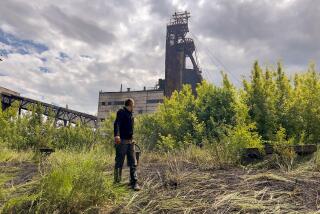Most Soviet Strikers Back at Coal Mines : But New Walkout Threat Looms in Estonian Republic
- Share via
MOSCOW — Most of the holdout strikers among Soviet coal miners returned to work Tuesday, but there was a new walkout threat elsewhere and another outburst of ethnic unrest.
At the same time, the revitalized Soviet Parliament called for “organized behavior and good deeds at this difficult period in Soviet history.”
Scores of mines reopened in the Donets coal basin in the Ukraine and in the Soviet far north after repeated assurances by President Mikhail S. Gorbachev and Premier Nikolai I. Ryzhkov that the strikers’ demands for improved wages, better working and living conditions and greater control over their collieries would be met.
It was not immediately clear whether there were any exceptions to the back-to-work trend, but if so, they were isolated and expected to come around within a short time.
The coal strikes, which began in Siberia two weeks ago, were the worst labor unrest here since the 1920s and idled more than 500,000 workers for at least part of the fortnight. Emphasizing the danger that they could trigger a chain reaction throughout the economy, Gorbachev referred to the unrest Monday as “perhaps the gravest test” of his four years in power.
Even as that challenge appeared to recede, a new one emerged in the tiny Baltic republic of Estonia, where representatives of the Russian minority called for new strikes to protest what they described as discrimination by the ethnic Estonian majority.
Tass, the official Soviet news agency, reported that scattered strikes had already begun Tuesday at two ship-repair yards, a radio plant and “several” other enterprises with mainly non-Estonian employees. Local officials told reporters by telephone that the stoppages lasted only a few hours.
At issue is a proposed change in the republic’s election law that would bar recent immigrants from voting or standing for public office. The controversial proposal, which is clearly aimed at the republic’s 40% Russian minority, would require voters to have at least two years’ residence and candidates to have been residents for either five years continuously or 15 years altogether.
The Russian protesters, who call themselves the Republican Strike Committee, also demand suspension of an Estonian language law enacted last January that requires virtually all residents to learn the native tongue.
Estonians are required to learn Russian, although many choose not to speak it. But tens of thousands of ethnic Russians who have migrated to the Baltic republic since it was forcibly annexed in 1940 do not speak Estonian, a Finno-Urgic language that is written in Latin letters and is more closely related to Hungarian or Finnish than to Russian.
Also, tension remained high in the southern republic of Georgia, where 21 people have been killed in clashes between Georgians and minority Abkhazians.
The Abkhazians, who live in a seaside region of the republic, want independent status as a separate republic, which the Georgians oppose.
According to one report from the Soviet Georgian capital of Tbilisi, independence activists Tuesday struck the windows of the KGB headquarters with their fists and threw eggs at a statue of Soviet founder Vladimir I. Lenin.
Sergei Dandurov, a Georgian dissident, told the Associated Press that several thousand demonstrators marched past KGB headquarters.
Some shouted “Down with the KGB!” and “The KGB is Gestapo!” while others pounded the building’s windows with their fists, he said.
The report could not be independently confirmed.
On Monday, 20,000 people marched through the capital of Tbilisi demanding independence from Moscow. That march was the largest there since troops used shovels, clubs and poison gas to break up a nationalist march in April, killing 20 people.
Meanwhile, Radio Moscow reported that flags flew at half staff Tuesday in Sukhumi, a resort town that is the capital of Abkhazia, in memory of the victims of the ethnic clashes.
According to Soviet news reports from the area, which has been closed to the foreign press, armed gangs numbering in the scores have engaged in a number of street fights. Two of the dead were police officers and the latest victim was a criminal investigator, Tass said.
The national Parliament, the Supreme Soviet, adopted an appeal to the Soviet people Tuesday cautioning that “strikes and ethnic conflicts in various regions do not help the common cause and can generate a chain reaction in many national industries, can aggravate the economic crisis and decelerate perestroika sharply.”
Perestroika , or restructuring, is the common name for Gorbachev’s program of political and economic reform here.
More to Read
Sign up for Essential California
The most important California stories and recommendations in your inbox every morning.
You may occasionally receive promotional content from the Los Angeles Times.













